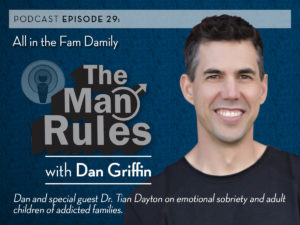The day that a child raised in addiction finally becomes an adult and sets out into the world on their own, is the day they finally feel free. Free from the chaos and the pressure and the terror that comes with growing up in a place where you never quite felt safe. Many Adult Children of Addiction (ACoAs) even gain tremendous strengths from growing up in such adverse circumstances and become extremely successful in many aspects of their lives.
There is a powerful line from the amazing movie Magnolia: “You may be through with the past, but the past isn’t through with you.” Unfortunately, most ACAs, even those who are high-achievers, at some point in their lives find that they were not, in fact, able to leave all of their pain behind them when they walked out the door. Particularly, once they begin forming intimate relationships and starting families of their own, they find themselves struggling in ways they don’t quite understand.

They blow up at their kids, they wall themselves off from their partners, they have unhealthy conflicts with friends, coworkers or neighbors. They never drink a drop of alcohol or use another drug, and yet it feels like they are suddenly turning into their parents – they are slowly becoming that which they promised they would never become. What the hell is going on?
In this episode of the Man Rules podcast, Dr. Tian Dayton explains what’s going on and gives a ton of poignant and life-affirming advice on how to make peace with your past so you can experience peace in the present.
SUBSCRIBE on iTunes, Stitcher, or your favorite podcasting app. And please leave us a review, if you haven’t already!
About Our Guest
Tian Dayton, MA, Ph.D., T.E.P is the director of The New York Psychodrama Training Institute where she runs training groups in psychodrama, sociometry and experiential group therapy. She served as Caron’s director of program development for eight years and Breathe’s for four. She was also a professor at NYU for eight years teaching psychodrama and currently sits on the Scientific Advisory Board for the National Association for Children of Alcoholics (NACoA). She is a fellow of the American Society of Psychodrama, Sociometry and Group Psychotherapy (ASGPP), and is the winner of their scholar’s award and the President’s award. She has served as Editor in Chief of the Journal of Psychodrama, Sociometry and Group Psychotherapy for ten years and as an executive editor for eight, she sits on the professional standards committee. She is also the winner of The Mona Mansell Award and The Ackermann Black Award for her contributions to the field of addiction.
Dr. Dayton has been a guest expert on NBC, CNN, MSNBC, Montel, Rikki Lake, John Walsh, and Geraldo. She is the author of fifteen books including, Neuropsychodrama in the Treatment of Relational Trauma, The ACoA Trauma Syndrome: How Childhood Trauma Impacts Adult Relationships, Emotional Sobriety: From Relationship Trauma to Resilience and Balance, Trauma and Addiction: Ending the Cycle of Pain Through Emotional Literacy, Heartwounds : The Impact of Unresolved Trauma and Grief on Relationships, Forgiving and Moving On , The Living Stage: A Step by Step Guide to Psychodrama and Experiential Therapy, The Magic of Forgiveness. She is also a Huffington Post blogger and a Thrive Global blogger. Her films and videos include The Process, A 73 Minute award-winning docudrama that uses Psychodrama to tell stories of addicts; Adult Children of Alcoholics, Trauma and The Body: A Psychodramatic Approach and Healing Childhood Abuse through Psychodrama. She is also a certified Montessori teacher and a Senior Fellow at The Meadows. For more information about Dr. Dayton, visit www.tiandayton.com
Mentioned in this Episode
Emotional Sobriety, Book by Tian Dayton
ACoA Trauma Syndrome, Book by Tian Dayton
I’ll Quit Tomorrow, Book by Vernon Johnson
Eugene O’Neill – “The past becomes the present.”
Dr. Rob Anda (ACES Study)
THRIVE workshop at The Meadows
Survivors workshops at The Meadows
Sharon Wegscheider-Cruse (Family Roles)
Addiction and Recovery Resources
Reliable resources for learning more about addiction and finding help for yourself, a friend, or a family member.
General Information about Addiction
SAMHSA – Substance Abuse and Mental Health Services Association
For People with Substance Addictions
For Families and Friends of People with Substance Addictions
SMART Recovery Family and Friends
Partnership for Drug-Free Kids

